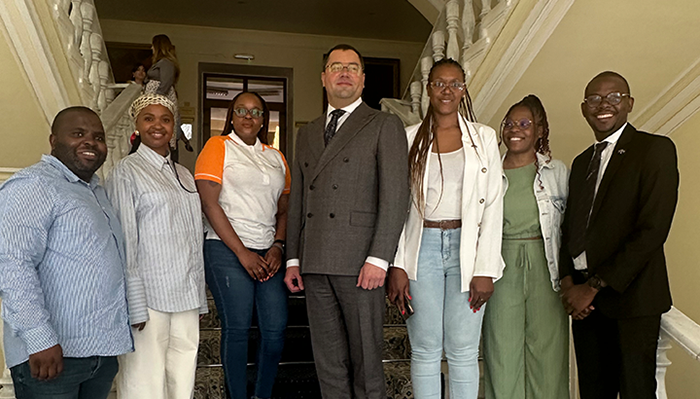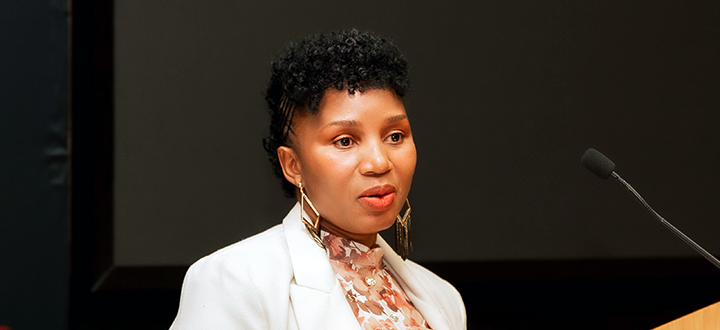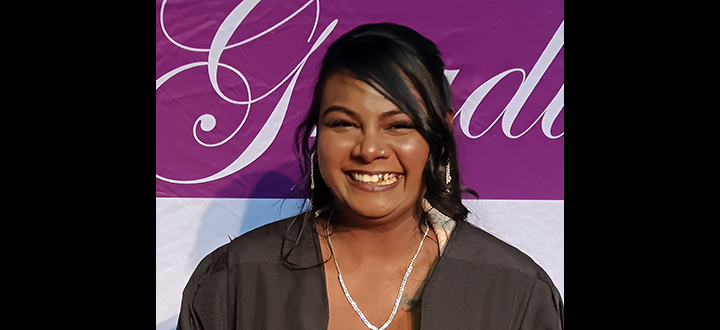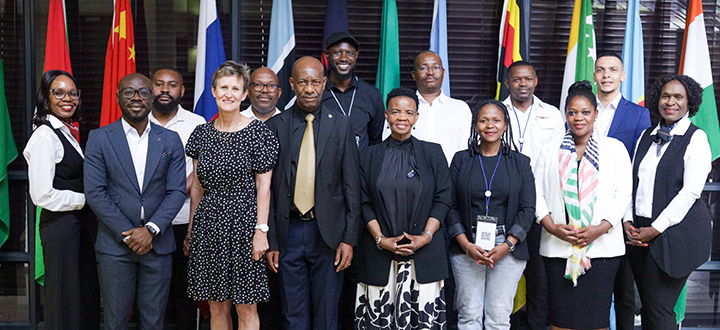College of Human Sciences
Unisa strengthens cultural ties with the Russian Federation

From left: Dr Dumisani Khumalo, Dr Sibusisiwe Nxongo, Nnana Martina Jege, Dr Pavel Moiseev (Rector of Derzhavin Tambov State University), Tumelo Ntsopi, Phumudzo Ratshinanga and Dr Napjadi Letsoalo
Six staff members from the College of Human Science visited Russia from 11 to 28 September 2025. The visit was conducted as part of the implementation of the 31 March 2023 Decree of the President of the Russian Federation, aimed at strengthening Russia’s position in the global humanitarian space, enhancing its positive perception abroad and reinforcing the role of the Russian language worldwide as a medium of international communication.
The Russian Language and Culture Programme took place over two weeks and was organised for the third time by the Mendeleev University of Chemical Technology and its regional partners.
Dr Napjadi Letsoalo, Chair of the Department of Linguistics and Modern Languages, Dr Dumisani Khumalo from the Department of African Languages, Dr Sibusisiwe Nxongo from the Department of History, Tumelo Ntsopi from the Department of English Studies, Phumudzo Ratshinanga from the Department of Communication Science, and Nnana Martina Jege from the Communication and Marketing Unit were joined by delegates from the University of Venda and Tshwane University of Technology.
The goal of the project is to strengthen partnerships between the Russian Federation and educational organisations on the African continent. Delegations from educational organisations in South Africa, Uganda, Tanzania and Gambia attended the programme with a view to implementing joint cultural projects and educational programmes. The delegation from these African countries participated in a language training course to update their knowledge of Russian history and culture, and visited various regions and universities within the Russian Federation.
According to Nxongo, the South African delegation spent three days in Moscow, after which it was divided into two groups for training programmes at the Tambov State University and the Stavropol State University, respectively. "I was impressed by how the Russian people take pride in their culture," said Nxongo. "They understand that a nation that does not take pride in its culture is a nation without identity."
Ntsopi and Khumalo shared their admiration for how the programme was meticulously planned, with clear objectives from the outset. "Our daily schedule effectively promoted and popularised Russian culture, education and language through interactive training sessions," they said. "Each class contextualised the language within Russia's culture, history and identity, complemented by immersive activities."
From a communication and marketing perspective, Ratshinanga and Jege noted that the museum visits revealed the Russian government's support for the arts and music, as well as its promotion of cultural tourism. They further stated that they observed that the Russian language served as the primary medium of instruction. Cultural event planning and language instruction strategies were identified as potential areas for collaboration and knowledge sharing.
Apart from being granted the opportunity to visit several museums, the group also visited the house of the famous Russian painter Alexander Gerasimov and the Tambov Planetarium. The numerous excursions allowed the group to explore possible collaboration with Unisa concerning its catalytic niche areas.
Letsoalo said that he is grateful for the opportunity to have been part of the programme and acknowledged the role the Unisa Internationalisation and Partnerships Directorate played in assisting delegates in preparing for their trip. He mentioned that a highlight for him was the formal meeting with the Rector of Tambov State University and the institution’s three vice-rectors. "We discussed potential areas for collaboration, which was a great opportunity to build bridges between our universities," he said.
He further stated that the trip was a powerful reminder of how people can learn from each other when they come together through education and cultural exchange.
Another group from Unisa will depart for Russia in November to teach isiZulu.
* By Nnana Martina Jege, Communication and Marketing Specialist, College of Human Sciences
Publish date: 2025-10-15 00:00:00.0


 Wings of opportunity: Bringing drones into the classroom
Wings of opportunity: Bringing drones into the classroom
 Visionary youth champion to address Unisa’s Innovation Festival
Visionary youth champion to address Unisa’s Innovation Festival
 Finding the strength to persevere
Finding the strength to persevere
 Disability awareness at Unisa: Disability is not inability
Disability awareness at Unisa: Disability is not inability
 Unisa symposium shares knowledge on building SA's aviation economy
Unisa symposium shares knowledge on building SA's aviation economy